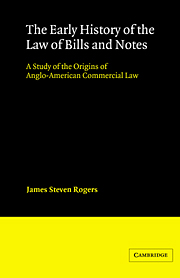 The Early History of the Law of Bills and Notes
The Early History of the Law of Bills and Notes Published online by Cambridge University Press: 22 September 2009
One of the meanings that is sometimes given to the notion that the law of bills developed by incorporation of the law merchant is that the judges of the common law courts looked to the writings of continental jurists and their English followers as the basis of the law of bills. It is certainly true that by the seventeenth century a substantial literature had developed outside the sphere of the common law on the subject of mercantile affairs and mercantile law. This chapter considers whether it is really the case that this body of literature had any significant influence on the development of the English law of bills of exchange in the seventeenth century.
CIVILIAN LITERATURE ON THE LAW MERCHANT AND EXCHANGE
In the sixteenth and seventeenth centuries, continental jurists began to regard the affairs of merchants as matters of sufficient interest to warrant special attention and separate treatment in legal writing. Beginning with Benvenuto Straccha's De Mercatura, seu Mercatore Tractatus published in Venice in 1553, a substantial literature on commercial law developed. From the time of Sigismundo Scaccia's Tractatus Commerciis et Cambio (1619), exchange transactions were an important topic in this literature. As Sutherland has pointed out, one consequence of the continental jurists' interest in merchants' affairs was that the phrase ‘law merchant’ took on a new meaning. In medieval times the term had little more content than the notion that cases involving travelling merchants should be resolved expeditiously.
To save this book to your Kindle, first ensure [email protected] is added to your Approved Personal Document E-mail List under your Personal Document Settings on the Manage Your Content and Devices page of your Amazon account. Then enter the ‘name’ part of your Kindle email address below. Find out more about saving to your Kindle.
Note you can select to save to either the @free.kindle.com or @kindle.com variations. ‘@free.kindle.com’ emails are free but can only be saved to your device when it is connected to wi-fi. ‘@kindle.com’ emails can be delivered even when you are not connected to wi-fi, but note that service fees apply.
Find out more about the Kindle Personal Document Service.
To save content items to your account, please confirm that you agree to abide by our usage policies. If this is the first time you use this feature, you will be asked to authorise Cambridge Core to connect with your account. Find out more about saving content to Dropbox.
To save content items to your account, please confirm that you agree to abide by our usage policies. If this is the first time you use this feature, you will be asked to authorise Cambridge Core to connect with your account. Find out more about saving content to Google Drive.